Articles
- Page Path
- HOME > Korean J Community Nutr > Volume 19(4); 2014 > Article
-
Research Article
- Development of Nutrition Education Program for Consumers to Reduce Sodium Intake Applying the Social Cognitive Theory: Based on Focus Group Interviews
- So-Hyun Ahn, Hye-Kyeong Kim, Kyung Min Kim, Jin-sook Yoon, Jong Sook Kwon
-
Korean Journal of Community Nutrition 2014;19(4):342-360.
DOI: https://doi.org/10.5720/kjcn.2014.19.4.342
Published online: August 31, 2014
1Department of Food Science and Nutrition, Catholic University, Bucheon, Korea.
2Department of Food and Nutrition, Baewha Women's University, Seoul, Korea.
3Department of Food and Nutrition, Keimyung University, Taegu, Korea.
4Department of Food and Nutrition, Shingu College, Songnam, Korea.
- Corresponding author: Jong Sook Kwon. Department of Food and Nutrition, Shingu College, 377 Gwangmyeong-ro, Seongnam, Gyeonggi-do 462-743, Korea. Tel: (031) 740-1642, Fax: (031) 740-1590, jskwon@shingu.ac.kr
Copyright © 2014 The Korean Society of Community Nutrition
This is an Open-Access article distributed under the terms of the Creative Commons Attribution Non-Commercial License (http://creativecommons.org/licenses/by-nc/3.0/) which permits unrestricted non-commercial use, distribution, and reproduction in any medium, provided the original work is properly cited.
- 1,369 Views
- 7 Download
- 14 Crossref
Abstract
-
Objectives
- This study aimed to develop nutrition education program for consumers to reduce sodium intake based on social cognitive theory (SCT).
-
Methods
- The main factors of SCT related to low sodium diet were investigated by using focus group interview (FGI) with 30 women who participated in consumer organizations.
-
Results
- The main target groups for the education program were housewives (H), parents (P), and the office workers (OW), for which we considered their influences on other people and the surroundings. According to the results of FGI, in carrying out low sodium diet, 'positive outcome expectation' were prevention of chronic disease and healthy dietary habit, and 'negative outcome expectation' were low palatability of foods, difficulty in cooking meals, and limited choice of foods. The contents of the program and education materials were individualized by each group to raise self-efficacy and behavioral capability, which reflected the results of the FGI. The program included 'salt intake and health' to raise positive outcome expectation. For improving the ability to practice low-sodium diet, the program contained the contents that focused on 'cooking' and 'food purchasing' for H, on 'purchasing and selection of low-sodium food with the children' for P, and on 'way of selecting restaurant menu' for OW. Also the program included 'way of choosing the low-sodium foods when eating out' with suggestions on sodium content of the dishes and snacks. Further, 'dietary guidelines to reduce sodium intake' was also suggested to help self-regulation.
-
Conclusions
- This nutrition education program and education materials could be utilized for the community education and provide the basis for further consumer targeted education program for reducing sodium intake.
-
This research was supported by grants from Korea Food and Drug Administration fund. (11162Sobiyeon165).
NOTES
- 1. Ahn SH, Kwon JS, Kim K, Yoon JS, Kang BW, Kim JW, Heo S, Cho HY, Kim HK. Study on the eating habits and practicability of guidelines for reducing sodium intake according to the stage of change in housewives. Korean J Community Nutr 2012; 17(6): 724-736.Article
- 2. Bandura A. Social cognitive theory of mass communication. Media Psychol 2001; 3(3): 265-299.Article
- 3. Bandura A. Social cognitive theory in cultural context. Appl Psychol 2002; 51(2): 269-290.Article
- 4. Bandura A. Health promotion by social cognitive means. Health Educ Behav 2004; 31(2): 143-164.ArticlePubMedLink
- 5. Blaustein MP, Hamlyn JM. Role of a natriuretic factor in essential hypertension: an hypothesis. Ann Intern Med 1983; 98(5 pt 2): 785-792.ArticlePubMed
- 6. Boyle MA, Morris DH. Community nutrition in action: an entrepreneurial approach. 2nd ed. Belmont (CA): Wadsworth Pub. Co.; 1999.
- 7. Chobanian AV, Hill M. National heart, lung, and blood institute workshop on sodium and blood pressure: a critical review of current scientific evidence. Hypertension 2000; 35(4): 858-863.ArticlePubMed
- 8. Anderson ES, Winett RA, Wojcik JR. Self-regulation, self-efficacy, outcome expectations, and social support: Social cognitive theory and nutrition behavior. Ann Behav Med 2007; 34(3): 304-312.ArticlePubMed
- 9. Glanz K, Rimer BK, Viswanath K. Three: the health belief model. In: Champion VL, Skinner CS, editors. Health behavior and health education: theory, research, and practice. 4th ed. San Francisco (CA): Joseey-Bass; 2008. p. 45-62.
- 10. Glanz K, Lewis FM, Romer BK. 1. The scope of health promotion and health education. In: Glanz K, Lewis FM, Romer BK, editors. Health behavior and health education: theory, research, and practice. 2nd ed. San Francisco (CA): Jossey-Bass Publishers; 1997. p. 3-18.
- 11. Hearn MD, Baranowski T, Baranowski J, Doyle C, Matthew S, Lin LS, Resnicow K. Environmental influences on dietary behavior among children: availability and accessibility of fruits and vegetables enable consumption. J Health Educ 1998; 29(1): 26-32.Article
- 12. Huh GY. Risk factor analysis of hypertension and development of FFQ and nutrition education program. The Catholic University of Korea; 2003; 120-148 Dissertation.
- 13. Chung EJ, Shim E. Salt-related dietary behaviors and sodium intakes of university students in Gyeonggi-do. J Korean Soc Food Sci Nutr 2008; 37(5): 578-588.Article
- 14. Jung YY, Shin EK, Lee HJ, Lee NH, Chun BY, Ann MY, Lee YK. Development and evaluation of a nutrition education program on sodium reduction in elementary school students. Korean J Community Nutr 2009; 14(6): 746-755.
- 15. Jung EJ, Son SM, Kwon JS. The effect of sodium reduction education program of a public health center on the blood pressure, blood biochemical profile and sodium intake of hypertensive adults. Korean J Community Nutr 2012; 17(6): 752-771.Article
- 16. Chapman-Novakofski K, Karduck J. Improvement in knowledge, social cognitive theory variables, and movement through stages of change after a community-based diabetes education program. J Am Diet Assoc 2005; 105(10): 1613-1616.ArticlePubMed
- 17. Kim S. A baseline study on housewife-consumer education in the information society. Korean J Hum Ecol 2004; 13(3): 425-440.
- 18. Kim HH, Shin EK, Lee HJ, Lee NH, Chun BY, Ahn MY, Lee YK. Evaluation of the effectiveness of a salt reduction program for employees. Korean J Nutr 2009; 42(4): 350-357.Article
- 19. Kim YS, Lee MJ. Effects of nutrition education through social cognitive theory in elementary school students -Focusing on the nutrition education of sugar intake-. Korean J Food Nutr 2011; 24(2): 246-257.Article
- 20. Son SM. A symposium of reducing sodium intake. Cheongju: Korea Food and Drug Administration; Korea Health Industry Development Institute; 2010. p. 7-12.
- 21. Korea Food and Drug Administration. Healthy menu with reduced sodium. 2014; cited June 20, 2014]. Available from http://www.foodnara.go.kr/lowna/index.do.
- 22. Korea Food and Drug Administration. Headquarters of reducing sodium intake. 2014; cited June 20, 2014]. Available from http://www.foodnara.go.kr/Na_down/res/contents/natrium1.jsp.
- 23. Lee Y, Park HN. The effectiveness of na education program in elementary school: six month follow-up study. Korean J Community Nutr 2010; 15(5): 603-613.
- 24. Lennie TA, Worrall-Carter L, Hammash M, Odom-Forren J, Roser LP, Smith CS, Trupp R, Chung ML, Moser DK. Relationship of heart failure patients' knowledge, perceived barriers, and attitudes regarding low-sodium diet recommendations to adherence. Prog Cardiovasc Nurs 2008; 23(1): 6-11.ArticlePubMed
- 25. Mansyur CL, Pavlik VN, Hyman DJ, Taylor WC, Coodrick GK. Self-efficacy and barriers to multiple behavior change in low-income African Americans with hypertension. J Behav Med 2013; 36(1): 75-85.ArticlePubMedPDF
- 26. Miller CK, Edwards L, Kissling G, Sanville L. Evaluation of a theory-based nutrition intervention for older adults with diabetes mellitus. J Am Diet Assoc 2002; 102(8): 1069-1081.ArticlePubMed
- 27. Ministry of Health and Welfare, Korea Centers for Disease Control and Prevention. Korea Health Statistics 2011: Korea National Health and Nutrition Examination Survey (KNHANES V-2). Cheongwon: Korea Centers for Disease Control and Prevention; 2012.
- 28. Moon EH, Kim KW. Evaluation of nutrition education for hypertension patients aged 50 years and over. Korean J Community Nutr 2011; 16(1): 62-74.Article
- 29. Mori K, Suzuki H, Wang DH, Takaki J, Takigawa T, Ogino K. Relationship of psychological factors with physical activity stage of change in prime-and middle-aged Japanese. Acta Med Okayama 2009; 63(2): 97-104.PubMed
- 30. Park N, Sohn S. The effects of food safety education on children's food safety knowledge, belief, attitude, and behavior. Consum Policy Educ Rev 2010; 6(1): 47-66.
- 31. Park S, Kwon JS, Kim CI, Lee Y, Kim HK. Development of nutrition education program for hypertension based on health belief model, applying focus group interview. Korean J Community Nutr 2012; 17(5): 623-636.Article
- 32. Sallis JF, Glanz K. Physical activity and food environments: solutions to the obesity epidemic. Milbank Q 2009; 87(1): 123-154.ArticlePubMedPMC
- 33. Sheahan SL, Fields B. Sodium dietary restriction, knowledge, beliefs, and decision-making behavior of older females. J Am Acad Nurse Pract 2008; 20(4): 217-224.ArticlePubMed
- 34. Silverman D. Doing qualitative research. 3rd ed. London: SAGE; 2010.
- 35. Son SM, Park YS, Lim WJ, Kim SB, Jeong YS. Development and evaluation of validity of short dish frequency questionnaire (DFQ) for estimation of habitual sodium intake for Korean adults. Korean J Community Nutr 2007; 12(6): 838-853.
- 36. Son SM, Lee KH, Kim KW, Lee YK. Social cognitive theory. Nutrition education and counseling. Seoul: Lifescience; 2007. p. 19-25.
- 37. Winett RA, Anderson ES, Wojcik JR, Winett SG, Bowden T. Guide to health: nutrition and physical activity outcomes of a group-randomized trial of an internet-based intervention in churches. Ann Behav Med 2007; 33(3): 251-261.ArticlePubMed
- 38. Yim KS. The effects of a nutrition education program for hypertensive female elderly at the public health center. Korean J Community Nutr 2008; 13(5): 640-652.
- 39. Yoo T, Yoo HR. Part two: models of Individual health behavior. Health behavior and health education: theory, research, and practice. 3rd ed. Seoul: Koonja; 2009. p. 43-69 English written by Glanz K, Rimer BK, Lewis FM.
- 40. Yoon HS, Lee H, Lee SK. Factors associated with the use of health promotion program -Seoul community health center-. Health Soc Welf Rev 2008; 28(2): 157-184.Article
- 41. Zhang J, Xu AQ, Ma JX, Shi XM, Guo XL, Engelgau M, Yan LX, Li Y, Li YC, Wang HC, Lu ZL, Zhang JY, Liang XF. Dietary sodium intake: knowledge, attitudes and practices in Shandong Province, China, 2011. PLoS One 2013; 8(3): e58973.ArticlePubMedPMC
REFERENCES
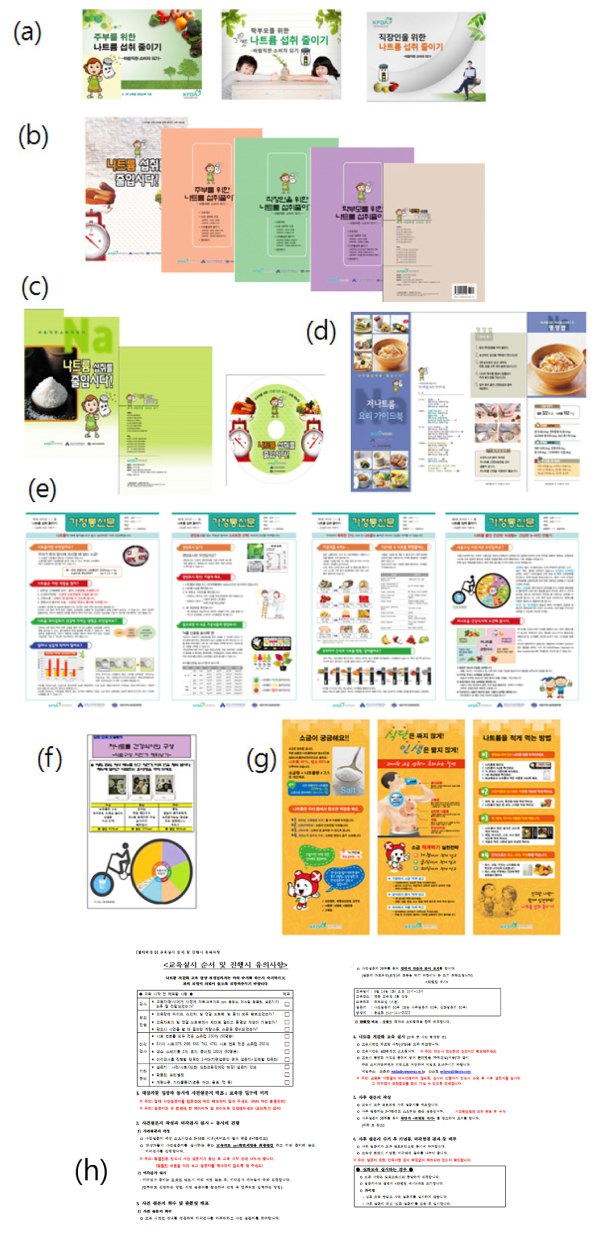
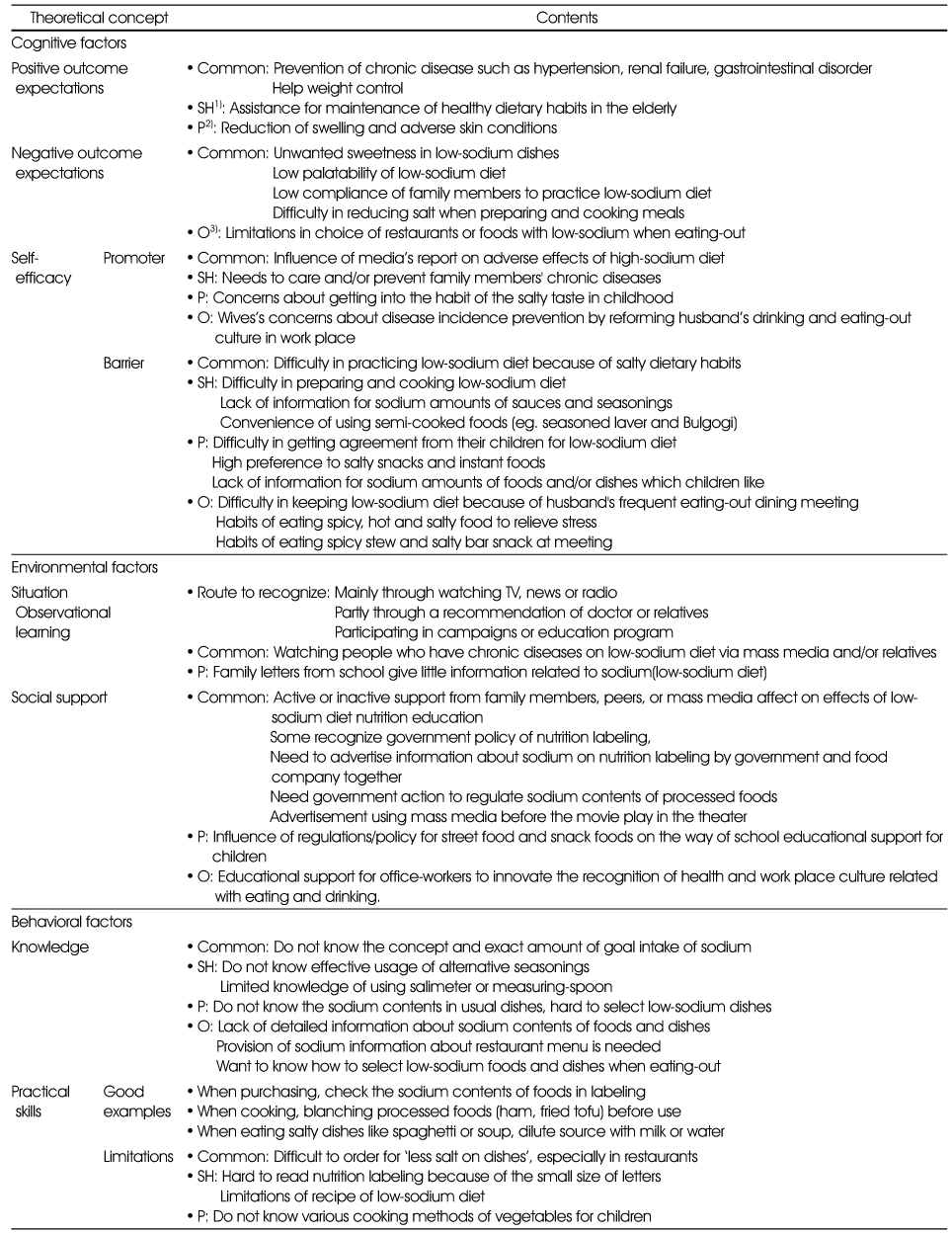
Figure & Data
REFERENCES
Citations

- Behavioral intention toward planetary health diet among adult users of government worksite cafeterias in Seoul, South Korea: a mixed-methods study based on the theory of planned behavior and focus groups interviews
Ji-Won Kang, Su-Jin Lee, Sil-Ah Kim, Ji-Yun Hwang
Korean Journal of Community Nutrition.2025; 30(3): 224. CrossRef - Outcome expectations, self-efficacy, eating environment, and eating behaviors by the stages of change in adequate sodium intake among university students: a cross-sectional study
Yeon Gyu Im, Kyung Won Kim
Korean Journal of Community Nutrition.2024; 29(5): 382. CrossRef - Development and evaluation of a nutrition education program for housewives to reduce sodium intake: application of the social cognitive theory and a transtheoretical model
Sohyun Ahn, Jong-Sook Kwon, Kyungmin Kim, Hye-Kyeong Kim
Journal of Nutrition and Health.2022; 55(1): 174. CrossRef - A Qualitative Study of the Awareness and Influencing Factors of the Dietary Habits of the Male and Female Workers' at a Manufacturing Facility in Gwangju
Ji Suk Yim, Young-Ran Heo
Korean Journal of Community Nutrition.2022; 27(1): 12. CrossRef - Reach Out Emergency Department: Partnering With an Economically Disadvantaged Community in the Development of a Text-Messaging Intervention to Address High Blood Pressure
Emily Champoux, Rory Price, Joan E. Cowdery, Mackenzie Dinh, William J. Meurer, Narmeen Rehman, Caitlin Schille, Alina Oliver, Devin L. Brown, Jordan Killingsworth, Lesli E. Skolarus
Health Promotion Practice.2020; 21(5): 791. CrossRef - Factors contributing to the reduction of sodium intake by food manufacture and cooking venues according to the national sodium reduction policies
Kirang Kim, Sohyun Park, Jee Young Kim
Journal of Nutrition and Health.2020; 53(6): 648. CrossRef - A Comparative Study on the Awareness of Health Risks and the Risk Reduction Measures Related to Sodium Intake between Female and Male University Students in Busan and Gyeongnam: An Application of Protection Motivation Theory
Soo-Hyun Jang, Eunju Yoon
Korean Journal of Food & Cookery Science.2016; 32(1): 136. CrossRef - School Dietitian Awareness, Practice, and Sodium Reduction Plan in School Meal Service
Eun Kyung Kim, Hae Young Kim
Korean Journal of Food & Cookery Science.2016; 32(2): 222. CrossRef - Evaluation of a Nutrition Education Program Designed to Reduce Sugar Intake in Preschool Children
Ma-Young Yeom, Youn-Ok Cho
Journal of the Korean Dietetic Association.2016; 22(3): 179. CrossRef - Perception on Optimal Diet, Diet Problems and Factors Related to Optimal Diet Among Young Adult Women Using Focus Group Interviews: Based on Social Cognitive Theory
Hye Jin Kim, A Reum Lee, Kyung Won Kim
Korean Journal of Community Nutrition.2016; 21(4): 332. CrossRef - ‘When operating a cafeteria, sales come before nutrition’ – finding barriers and facilitators to serving reduced-sodium meals in worksite cafeterias
Sohyun Park, Jounghee Lee
Public Health Nutrition.2016; 19(8): 1506. CrossRef - Study on Energy and Nutrient Intake and Food Preference of the Elderly in Care Facilities
Jong-Sook Kwon, Seung Hee Lee, Kang Min Lee, Yoonna Lee
Korean Journal of Community Nutrition.2016; 21(2): 200. CrossRef - Evaluation of Consumer Nutrition Education Program to Reduce Sodium Intake Based on Social Cognitive Theory
So-Hyun Ahn, Jong Sook Kwon, Kyung Min Kim, Jin-Sook Yoon, Hye-Kyeong Kim
Korean Journal of Community Nutrition.2015; 20(6): 433. CrossRef - The Development of a Nutrition Education Program for Low-income Family Children by applying the Social Cognitive Theory and Health Belief Model
Saes-byoul Lee, Yu-Ri Jeong, Hyo-Jin Ahn, Min-Ji Ahn, Su-A Ryu, Nam-E Kang, Se-Young Oh
Korean Journal of Community Nutrition.2015; 20(3): 165. CrossRef
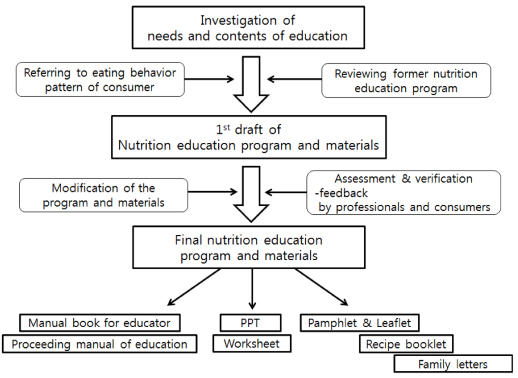

Fig. 1
Fig. 2
The questions used for focus group interview based on social cognitive theory
The general characteristics of the participants in focus group interview
1) Student's t-test
2) Chi-square test
**: p < 0.01.
THe major themes and contents for social cognitive theory from Focus Group Interview (n = 30)
1) SH: senior housewives 2) P: parents 3) O: office-workers
Needs on nutrition education programs for reducing sodium intake (n = 30)
1) P: parents 2) O: office-workers
The contents of recipe booklet for nutrition education
The nutrition education program for senior housewives to reduce sodium intake
1) B: behavioral factors, 2) E: Environmental factors, 3) C: cognitive factors
The nutrition education program for parents to reduce sodium intake
1) B: behavioral factors, 2) E: Environmental factors, 3) C: cognitive factors
The nutrition education program for office-workers to reduce sodium intake
1) B: behavioral factors, 2) E: Environmental factors, 3) C: cognitive factors
1) Student's t-test 2) Chi-square test **: p < 0.01.
1) SH: senior housewives 2) P: parents 3) O: office-workers
1) P: parents 2) O: office-workers
1) B: behavioral factors, 2) E: Environmental factors, 3) C: cognitive factors
1) B: behavioral factors, 2) E: Environmental factors, 3) C: cognitive factors
1) B: behavioral factors, 2) E: Environmental factors, 3) C: cognitive factors

 KSCN
KSCN

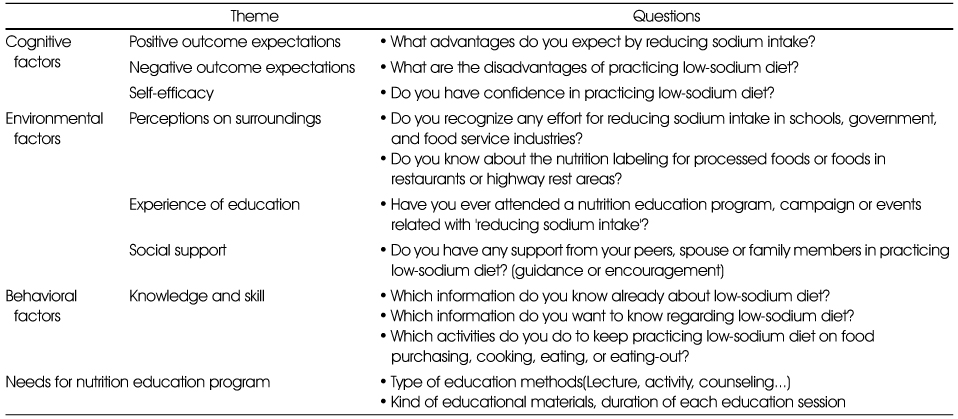

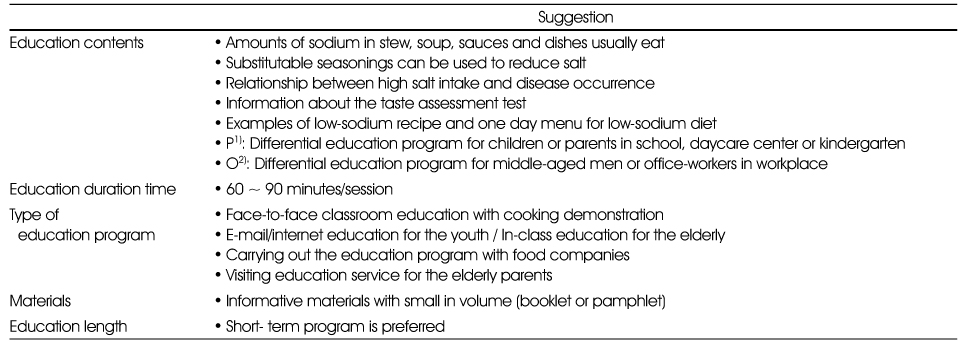
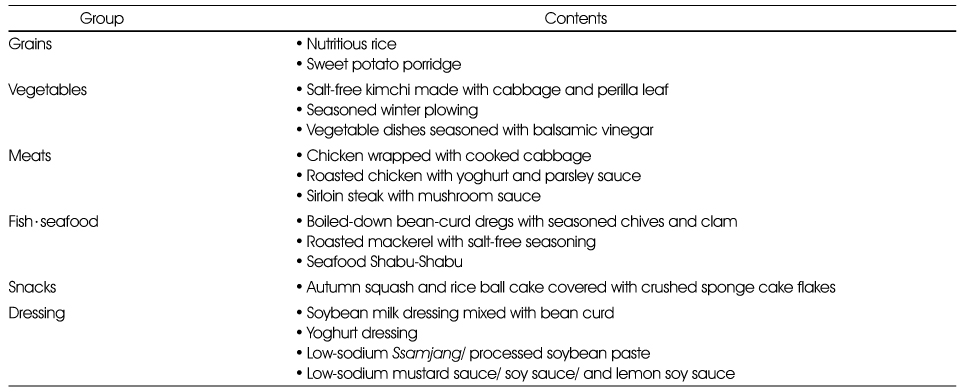
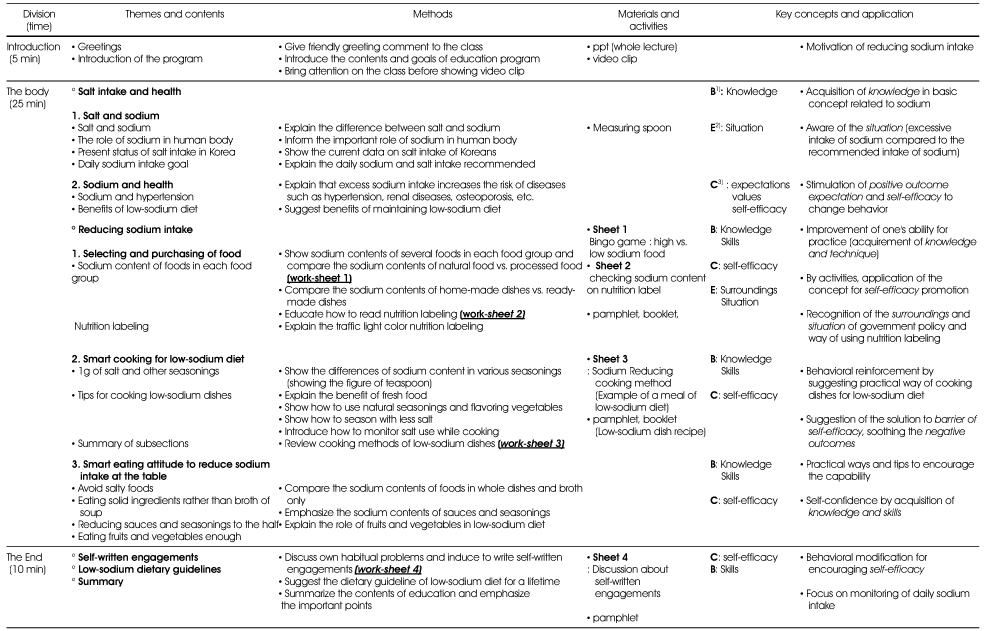
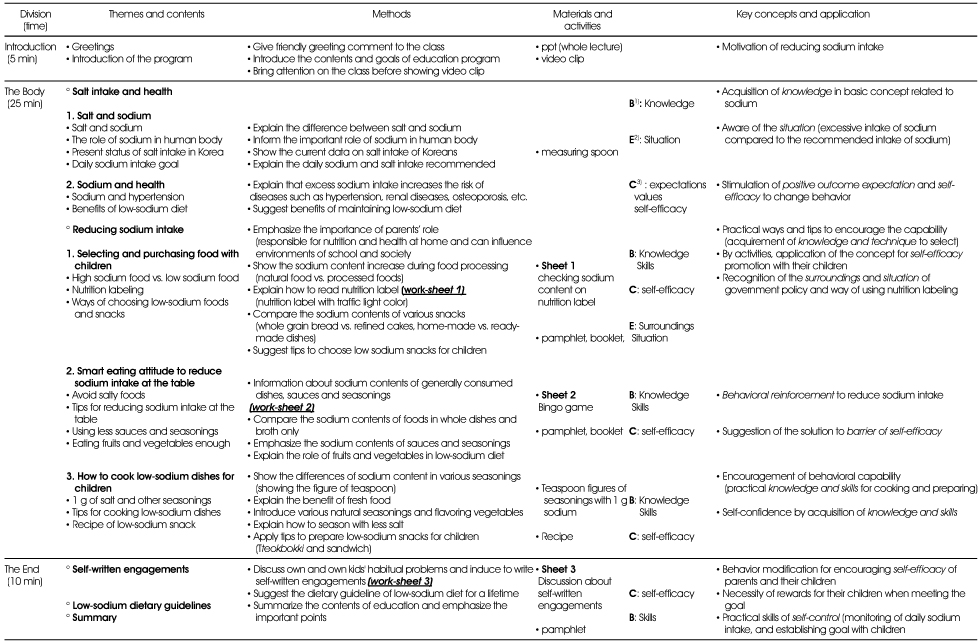
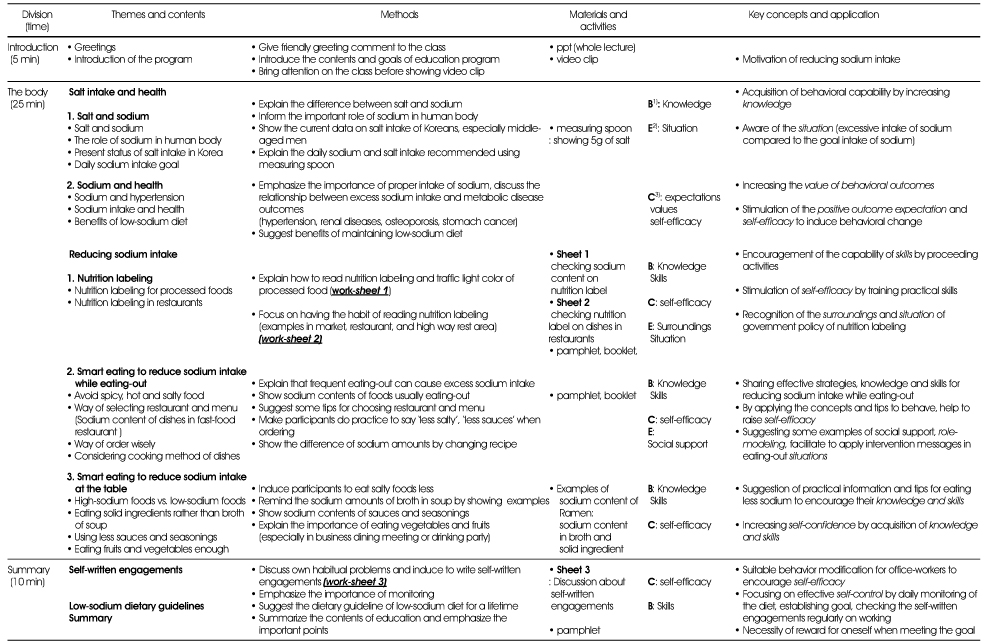
 Cite
Cite


